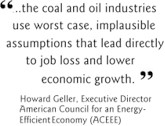| |
  |
| Feature Articles: Ciizens Want Teeth In Environmental Laws Fight Global Warming: Create Jobs and Benefit the EconomyClimate Control Would Save Millions Of Lives Recycled Glass Applications Expand Mass Transit Critical to Chattanooga's Turnaround
|
"New technologies, such as more efficient appliances, lighting, vehicles, and industrial processes, as well as renewable energy sources, are the key to cutting GHG emissions without harming the economy. By taking a technology-oriented approach, the United States and other nations can create new industries and jobs, save consumers money, and greatly reduce GHG emissions," Geller continued. Geller recently testified before the Small Business Committee of the U.S. House of Representatives on the positive economic impacts from combating global warming. He presented nine examples of small and medium-sized businesses that are growing and thriving by either manufacturing energy-saving products or renewable energy equipment, or employing energy-saving practices in their own operations. Among these examples:
Previous studies by ACEEE and others have shown that the U.S. can achieve its Kyoto target with a net increase of 800,000 jobs by 2010. "A shift away from fossil fuels such as coal and petroleum and towards greater energy efficiency and renewable energy technologies would be good for the U.S. economy. It would save consumers money, cut oil imports, and shift consumer expenditures towards sectors of the economy that are more labor-intensive than energy supply," commented Geller. The Global Climate Coalition consists of coal and oil producers and some manufacturers that use large quantities of these dirty fossil fuels. "It is no surprise that the GCC would use worst case assumptions to mislead the public about the job impacts of shifting from fossil fuels towards greater efficiency and renewable energy sources," concluded Geller.
For the full text of the ACEEE testimony on the economic impacts of
the Kyoto Protocol on small business, visit the ACEEE web site at http://aceee.org.
|
|
EcoIQ Magazine HOME
| Feature Articles | News Briefs |
Resources |
Reviews | Opinion EcoIQ.com Site Home | EcoSpeakers.com | EcoSpeakers Bookstore | EcoIQTV.com © Copyright 1998 EcoIQ |



 "The Global Climate Coalition and the coal and oil industries use worst
case, implausible assumptions that lead directly to job loss and lower
economic growth. These assumptions include imposition of a carbon tax
without offsetting reductions in other taxes, no consideration of technological
innovation, no cost savings from energy efficiency improvements, no
benefits from reducing smog, soot, and acid rain with the same technologies
that reduce greenhouse gas (GHG) emissions, and no international trading
or joint implementation. In effect, the Global Climate Coalition assumes
the Kyoto Protocol would be met in a costly, inflexible, dumb manner,"
noted Geller.
"The Global Climate Coalition and the coal and oil industries use worst
case, implausible assumptions that lead directly to job loss and lower
economic growth. These assumptions include imposition of a carbon tax
without offsetting reductions in other taxes, no consideration of technological
innovation, no cost savings from energy efficiency improvements, no
benefits from reducing smog, soot, and acid rain with the same technologies
that reduce greenhouse gas (GHG) emissions, and no international trading
or joint implementation. In effect, the Global Climate Coalition assumes
the Kyoto Protocol would be met in a costly, inflexible, dumb manner,"
noted Geller.
